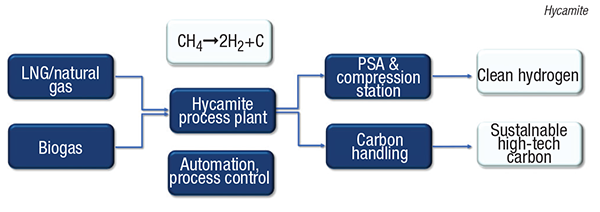Next year, construction will begin on an industrial-scale pilot plant to further develop a new process that decomposes methane into H2 and carbon. The process uses a thermo-catalytic decomposition (TCD) technology developed by Hycamite TCD Technologies Oy (Kokkola, Finland; www.hycamite.com). The pilot plant will be located in the Kokkola Industrial Park (KIP), which has the highest concentration of inorganic chemical industry in Northern Europe.

In the TCD process (diagram), natural gas or biogas is continuously fed to a fixed-bed or fluidized bed (or both) reactor operating at 500–800°C and 1 atm. In the reactor, CH4 is split into H2 and C using a proprietary catalyst that the company has developed over several years. H2 is purified (>95%) by pressure-swing absorption (PSA), and the unreacted CH4 is circulated back to the reactor. Solid carbon is discharged from the reactor, cooled and packaged. The technology can generate several different high-quality allotropes of carbon, and can be optimized for preferred allotropes.
Because the reactor is heated by hydrogen and renewable electricity, with heat recovery, there are zero CO2 emissions generated in the process. According to CEO Laura Rahikka, TCD hydrogen technology has the highest H2 yield per unit energy compared to steam methane reforming (SMR) and electrolysis of water. Based on the carbon product, the price of the H2 generated is “highly competitive” compared to other technologies, says Rahikka.
“Our goal is to implement large-scale hydrogen production over the next couple of years, using our new technology,” says Rahikka. “The hydrogen we generate can be used for clean energy production and for various industrial processes. Our output will enable companies to switch to hydrogen in the next few years, despite shortages in wind-powered hydrogen production that may continue for some time,” she says.